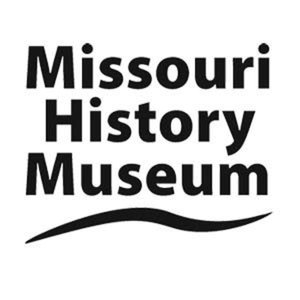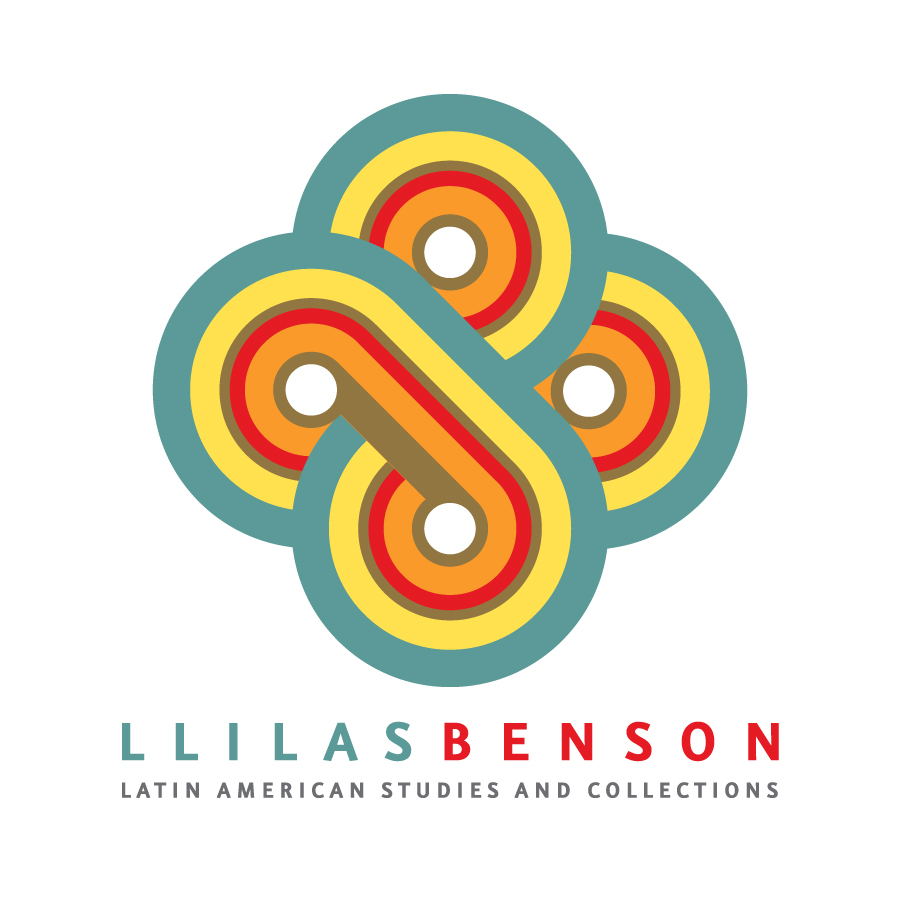from May. 1, 1865
Charles Francis Adams to Foreign Minister Earl Russell
-
Full Title
Charles Francis Adams to Foreign Minister Earl Russell
-
Description
Letterbook copy of dispatch from Charles Francis Adams, U.S. Minister to the United Kingdom, to John Russell, First Earl Russell, Foreign Minister of the United Kingdom, informing him of Lincoln's assassination.
-
Source
Office of the Historian, U.S. Department of State, and National Archives, Record Group 84
-
Rights
This item is in the public domain and may be reproduced and used for any purpose, including research, teaching, private study, publication, broadcast or commercial use, with proper citation and attribution.
-
Tags
-
Cite this Item
Charles Francis Adams. "Charles Francis Adams to Foreign Minister Earl Russell". Remembering Lincoln. Web. Accessed June 25, 2025. https://rememberinglincoln.fords.org/node/746
-
Creator
Charles Francis Adams
-
Date
May 1, 1865
from May. 1, 1865
Charles Francis Adams to Foreign Minister Earl Russell

-
Description
Letterbook copy of dispatch from Charles Francis Adams, U.S. Minister to the United Kingdom, to John Russell, First Earl Russell, Foreign Minister of the United Kingdom, informing him of Lincoln's assassination.
-
Source
Office of the Historian, U.S. Department of State, and National Archives, Record Group 84
-
Rights
This item is in the public domain and may be reproduced and used for any purpose, including research, teaching, private study, publication, broadcast or commercial use, with proper citation and attribution.
-
Creator
Charles Francis Adams
-
Date
May 1, 1865
from Apr. 28, 1865
Dispatch: Charles Francis Adams to Seward
-
Full Title
Embassy Despatch 936: Charles Francis Adams to William H. Seward
-
Description
Official dispatch from Charles Francis Adams, U.S. Minister to the United Kingdom, to William H. Seward, Secretary of State, acknowledging receipt of the news of the attacks upon Seward and President Abraham Lincoln, and discussing reaction in London.
-
Transcription
Aug 13, my [[Lincoln]]
[[tchfy1408]] [[Abe]]
No. 936.
Legation of the United States
London, 28 April, 1865
Sir:
I had the grief to receive the
day before yesterday the telegraphic
Despatches from Mr. Stanton, the
Secretary of War, and from Mr.
Hunter, the Chief Clerk of your
Department, announcing the af-
flicting event of the 14th, Instant
which has thrown our whole
people into such deep distress.
They also give a narrative of the
simultaneously savage onslaught
upon yourself in your sick room
and upon your son, the assistant
Secretary, which had not at the
latest date, and which I yet
permit myself to hope, will not
prove
The Hon: William H. Seward
Secretary of State.
Washington, D.C.
(Next Page)
prove fatal to either you.
I immediately took the
requisite measures to communicate
the intelligence to the different
legislators on the Continent.
It is but consistency that
a rebellion began in
perjury, treachery and fraud
should close with private
assassination.
The whole of the day was
one of the greatest excitements.
Few events of the present century
have created such general
consternation and indignation.
Many people called personally
at the legation to express their
deep sympathy and many more
sent me notes of the same tenor.
The notice taken by the
press are almost all of them
of a most honorable character.
(A. Hancock)
I transmit copies of the
leading newspapers. There
seems at last to be a general
testimony borne to the north noble
qualities
(Next Page)
qualities of the president and
the friendly disposition of the
Secretary of State.
Of all this eulogy he found
mingled with the alloy of
unworthy aspersions of the vice
President who succeeds, he has
abundant consolation in the
reflection that, when his predecessor
began, he was not a whit better
treated. It is a weakness of the
press and the people of this country
not to value some men properly
until they are lost. The cause of
the late Prince Consort is a
unremarkable instance.
The proceedings in the two
Houses of Parliament last evening
mark out the line proposed to
be adopted by the government
on this occasion.
I have the honor to be Sir,
your obedient servant,
Charles Francis Adams
[Transcription Team: Carli G., Summer D., Joslyn P., Tyler R.]
[New Hampton Middle School, New Hampton, Iowa] -
Source
Office of the Historian, U.S. Department of State and National Archives, Record Group 84
-
Rights
This item is in the public domain and may be reproduced and used for any purpose, including research, teaching, private study, publication, broadcast or commercial use, with proper citation and attribution.
-
Tags
-
Cite this Item
Charles Francis Adams. "Embassy Despatch 936: Charles Francis Adams to William H. Seward". Remembering Lincoln. Web. Accessed June 25, 2025. https://rememberinglincoln.fords.org/node/745
-
Creator
Charles Francis Adams
-
Date
April 28, 1865
from Apr. 28, 1865
Embassy Despatch 936: Charles Francis Adams to William H. Seward
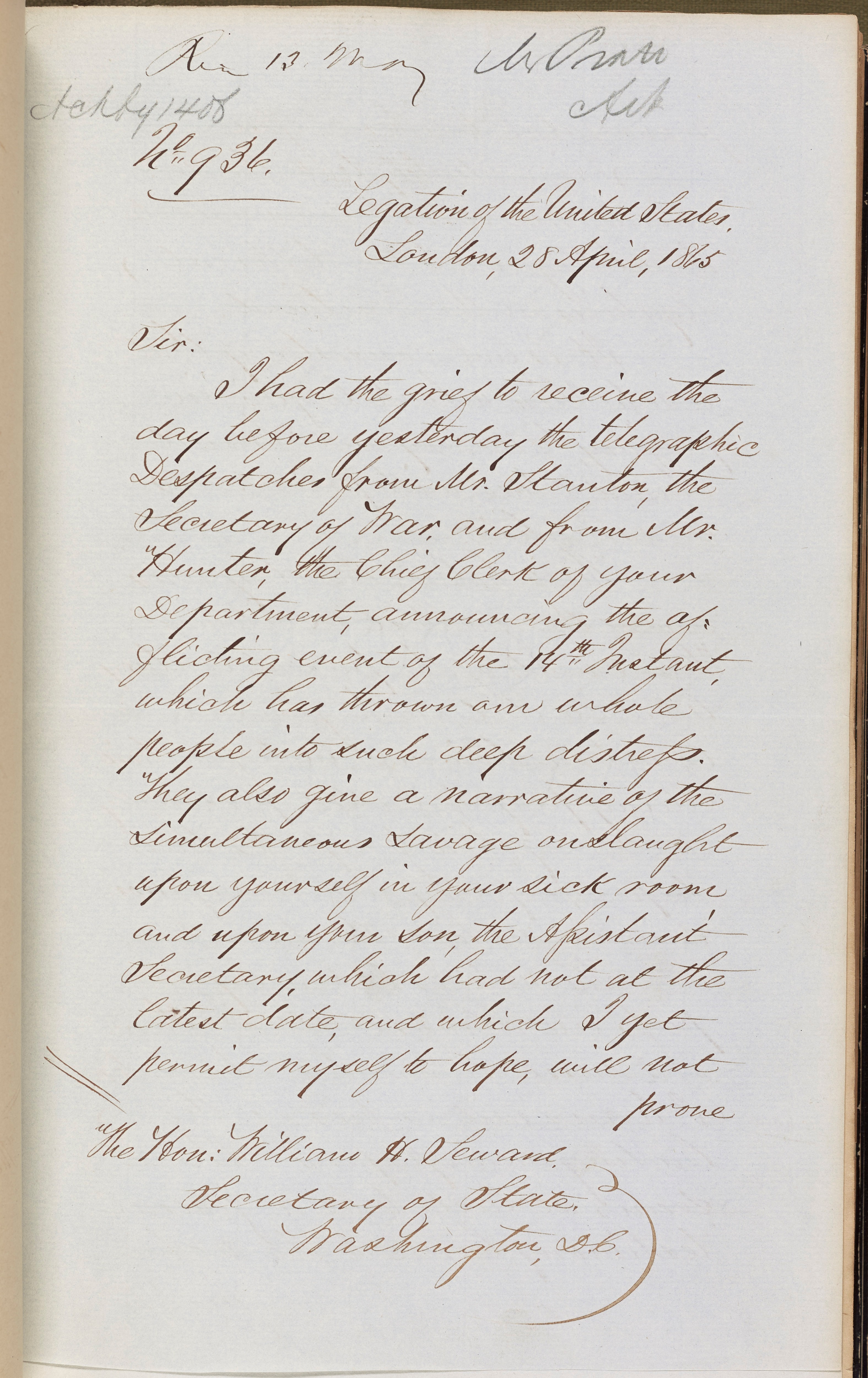
-
Description
Official dispatch from Charles Francis Adams, U.S. Minister to the United Kingdom, to William H. Seward, Secretary of State, acknowledging receipt of the news of the attacks upon Seward and President Abraham Lincoln, and discussing reaction in London.
-
Source
Office of the Historian, U.S. Department of State and National Archives, Record Group 84
-
Rights
This item is in the public domain and may be reproduced and used for any purpose, including research, teaching, private study, publication, broadcast or commercial use, with proper citation and attribution.
-
Creator
Charles Francis Adams
-
Date
April 28, 1865
from Apr. 17, 1865
Instruction, Hunter to Adams
-
Full Title
State Department Instruction 1352: William Hunter to Charles Francis Adams
-
Description
Official dispatch from William H. Hunter to Charles Francis Adams, U.S. Minister to the United Kingdom, informing him of Lincoln's assassination and the attempt on Secretary of State William H. Seward's life. Hunter notes that William and Frederick Seward are both expected to recover, but that, in the meanwhile, Hunter is serving as Acting Secretary of State. Because the Transatlantic telegraph cable was no longer functioning, Adams received this dispatch on April 30.
-
Transcription
Read. 30 Apr. 65.
Circular
No. 1352
Department of state.
Washington. 17th April 1865
Sir:
The melancholy duty devolves
upon me officially to apprise
You of the assassination of the
president at Ford’s theatre in this
city in the evening of the 14th instant.
He died the next morning from
the effects of the wound.
About the same time an
attempt was made to assassinate
the Secretary of State in his own
house where he was in bed &
Suffering from the effects of the
late accident. The attempt failed, but Mr. Seward was
severely cut, on the face especially
it is supposed with a bowie knife.
Mr J; H, Seward was felled by a
blow or blows on the head, from
the assassin, and for some time
afterwards was apparently
Unconscious
Charles Francis Adam, Esquire,
Next page
Unconscious. Both the Secretary
and assistant Secretary are better
especially the former.
Andrew Johnson has formally
entered upon the duties of
President.
I have been authorized
temporarily to act as Ssecretary
of State.
[[?]], Sir
Your obedient servant
W.J. Hunter
Acting Secretary
[Transcription Team: Joshua H., Caleb D., Conner R., Carson B.]
[New Hampton Middle School, New Hampton, Iowa]
-
Source
Office of the Historian, U.S. Department of State and National Archives, Record Group 84
-
Rights
This item is in the public domain and may be reproduced and used for any purpose, including research, teaching, private study, publication, broadcast or commercial use, with proper citation and attribution.
-
Tags
-
Cite this Item
William Hunter. "State Department Instruction 1352: William Hunter to Charles Francis Adams". Remembering Lincoln. Web. Accessed June 25, 2025. https://rememberinglincoln.fords.org/node/744
-
Creator
William Hunter
-
Date
April 17, 1865
from Apr. 17, 1865
State Department Instruction 1352: William Hunter to Charles Francis Adams
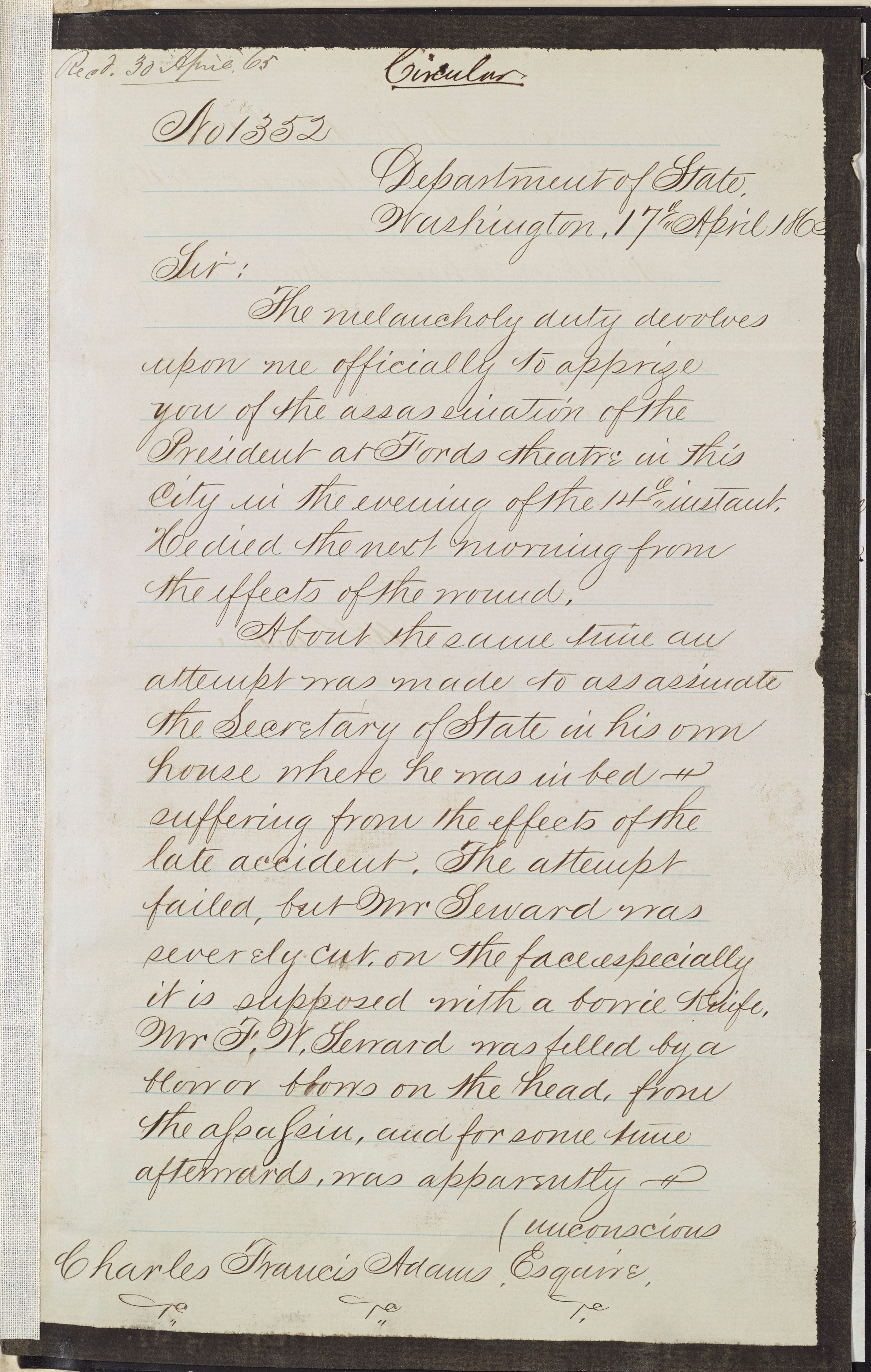
-
Description
Official dispatch from William H. Hunter to Charles Francis Adams, U.S. Minister to the United Kingdom, informing him of Lincoln's assassination and the attempt on Secretary of State William H. Seward's life. Hunter notes that William and Frederick Seward are both expected to recover, but that, in the meanwhile, Hunter is serving as Acting Secretary of State. Because the Transatlantic telegraph cable was no longer functioning, Adams received this dispatch on April 30.
-
Source
Office of the Historian, U.S. Department of State and National Archives, Record Group 84
-
Rights
This item is in the public domain and may be reproduced and used for any purpose, including research, teaching, private study, publication, broadcast or commercial use, with proper citation and attribution.
-
Creator
William Hunter
-
Date
April 17, 1865
from Apr. 15, 1865
Stanton Dispatch to Charles Francis Adams
-
Full Title
Dispatch, Edwin Stanton to Charles Francis Adams
-
Description
The official dispatch from U.S. Secretary of War Edwin Stanton to Charles Francis Adams, U.S. Minister to the United Kingdom, notifying the latter of the assassination of President Abraham Lincoln. Because the Transatlantic telegraph line was no longer operational, Adams did not receive the news for 11 days.
-
Transcription
Recd. 26 April, 1865
Charles Francis Adams
United States Minister, London
Washington, DC 15 April, 1865
Sir.
It has become my distressing duty to announce to you that last night His Excellency Abraham Lincoln President of The United States, was assassinated, about the hour of half past 10 o’clock, in his private box at Ford’s Theatre, in this city. The President about eight o’clock accompanied Mrs. Lincoln to the theatre. Another lady and gentleman were with them in the box. About half past ten during a pause in the performance, the assassin entered the box, the door of which was unguarded, hastily approached the President from behind, and discharged a pistol at his head. The bullet entered the back of his head, and penetrated nearly through. The assassin then leaped from the box upon the stage, brandishing a large knife or dagger, and exclaiming ‘Sic semper tyrannis!’ and escaped in the rear of the theatre. Immediately upon the discharge the President fell to the floor insensible, and continued in that state until 20 minutes past 7 o’clock this morning when he breathed his last. About the same time the murder was being committed at the Theatre another assassin presented himself at the door of Mr. Seward’s residence, gained admission by representing he had a prescription from Mr. Seward’s physicians which he was directed to see administered and hurried up to the third story chamber where Mr. Seward was lying. He here discovered Mr. Frederick Seward, struck him over the head, inflicting several wounds, and fracturing the skull in two places, inflicting, it is feared mortal wounds. He then rushed into the room where Mr. Seward was in bed, attended by a young daughter and a male nurse. The male attendant was stabbed through the lungs, and it is believed will die. The assassin then struck Mr. Seward with a knife or dagger twice in the throat and twice in the face, inflicting terrible wounds. By this time Major Seward, eldest son of the Secretary, and another attendant reached the room, and rushed to the rescue of the Secretary; they were also wounded in the conflict, and the assassin escaped. No artery or important blood vessel was severed by any of the wounds inflicted upon him, but he was for a long time insensible from the loss of blood. Some hope of his possible recovery is entertained. Immediately upon the death of the President notice was given to Vice President Johnson, who happened to be in the City, and upon whom the office of President now devolves. He will take the office and assume the functions of President to-day. The murderer of the President has been discovered, and evidence obtained that these horrible crimes were committed in execution of conspiracy deliberately planned and set on foot by rebels on pretence of avenging the South and aiding the rebel cause; but it is hoped that the (?) perpetrators will be caught.
The feeling occasioned by these atrocious crimes is so great, sudden, and overwhelming that I cannot at present do more than communicate them to you. At the earliest moment yesterday the late President called a Cabinet meeting, at which General Grant was present. He was more cheerful and happy than I had ever seen him, rejoiced at the near prospect of firm and durable peace at home and abroad, manifested in a marked degree the kindness and humanity of his disposition, and the tender and forgiving spirit that so eminently distinguished him. Public notice had been given that he and General Grant, would be present at the Theatre, and the opportunity of adding the Lieutenant General to the number of victims to be murdered was no doubt seized for the fitting occasion of executing the plans that appear to have been in preparation for some weeks, but General Grant was compelled to be absent, and thus escaped the designs upon him. It is needless for me to say anything in regard to the influence which this atrocious murder of the President may exercise upon the affairs of this country, but I will only add that, horrible as are the atrocities that have been resorted to by the enemies of the country, they are not likely in any degree to impair the public spirit, or postpone the complete and final overthrow of the rebellion. In profound grief for the events, which it has become my duty to communicate to you,
I have the honor to be
Very respectfully
Your obt. Servant
Edwin M. Stanton
[Transcription by Dale Anderson.] -
Source
Office of the Historian, U.S. Department of State and National Archives, Record Group 84
-
Rights
This item is in the public domain and may be reproduced and used for any purpose, including research, teaching, private study, publication, broadcast or commercial use, with proper citation and attribution.
-
Tags
-
Cite this Item
Edwin Stanton. "Dispatch, Edwin Stanton to Charles Francis Adams". Remembering Lincoln. Web. Accessed June 25, 2025. https://rememberinglincoln.fords.org/node/743
-
Creator
Edwin Stanton
-
Date
April 15, 1865
from Apr. 15, 1865
Dispatch, Edwin Stanton to Charles Francis Adams

-
Description
The official dispatch from U.S. Secretary of War Edwin Stanton to Charles Francis Adams, U.S. Minister to the United Kingdom, notifying the latter of the assassination of President Abraham Lincoln. Because the Transatlantic telegraph line was no longer operational, Adams did not receive the news for 11 days.
-
Source
Office of the Historian, U.S. Department of State and National Archives, Record Group 84
-
Rights
This item is in the public domain and may be reproduced and used for any purpose, including research, teaching, private study, publication, broadcast or commercial use, with proper citation and attribution.
-
Creator
Edwin Stanton
-
Date
April 15, 1865
from Apr. 1, 1865
Diplomats Allowed to Attend Lincoln Funeral
-
Full Title
List of the Diplomatic Corps entitled to attend the funeral ceremonies of Abraham Lincoln, [April] 1865
-
Description
Lists diplomats and other dignitaries from various countries who were invited to attend the funeral of President Abraham Lincoln.
-
Transcription
List of the Diplomatic Corps
1865
Entitled to attend the Funeral Ceremonies
[Page 2]
Envoys Extraordinary and Ministers Plenipotentiary
Portugal. The Commander J.C. de Figaniere e Morao
Charlestown, Md
Prussia. Baron von Gerolt
Washington
Guatemala. Senor [Señor] Don Antonio José de Yrisarri [Irisarri]
Brooklyn, N.Y.
Spain. Senor Don Gabriel Garcia y Tassara
Corcorans Row. I. St.
Russia. Mr. Eduard de Stoeckle [Stoeckl]
Cor. I. & Connecticut Avenue
Costa Rica, Nicaragua & Honduras Senor [Señor] Don Luis Molina
F. st. bet: 20th & 21st sts.
Great Britain. Sir Frederick Bruce
245 H Street
Belgium. Mr. Alfred Berghuans.
Washington.
[Page 3]
Netherlands. Mr Roest van Limburg
N.Y.
Mexico. Senor Don Matias Romero.
h. 263 G Street.
Denmark. Mr. W.R. Raasloff [Raasløff]
29 Fifth Avenue
h. 46 Clinton Place, N.Y.
Italy. The Commander Joseph Butinatti.
At Mrs. Mackall’s, 7 Buildings.
Venezuela. Senor [Señor] Blas Bruzual
h. 35. West35th33rd Street, N. York
United States of Columbia [Colombia]. Genl. Eustorgio Salgar
Gramercy Park Hotel New York.
Sweden and Norway. Baron N.G. de Wetterstedt.
Washington
[Page 4]
Ministers Resident
Hanseatic Republics
Austria. Count Wydenbruck.
Washington.
[Page 5]
Chargés d’ Affaires
Chili [Chile]. Senor [Señor] Don F. Asta Buruaga.
Corcoran’s Row, I St.
Hayti [Haiti]. Mr. W. D. Bruno.
France. Mr. de Geofroy.
310. H. Street.
Liberia. John B. Pinney
New York
Peru. Senor José Antonio Garcia y Garcia.
Gramercy House, New York.
Hanseatic Republics. Dr. Johannes Rosing.
Corner 6th and D. streets.
Brazil. Senhor Ignacio de Avellar Barbosa [Barloza] de [da] Silva
Washington.
Hawaii. S.W. F. Odell.
Great Britain. J. Hurne Burnley
245. H. St.
Belgium. Mr. Alfred Berghmans.
Washington
[Page 6]
First Secretaries
Prussia. Baron Guido von Grabow, Georgetown.
Russia. Mr. Waldemar de Bodisco. do [Georgetown]
Italy. Mr. Henry Cora. Washington
Peru. Don Emilio Bonifaz. Gramercy Park Hotel N. York.
Mexico. Señor Don Ignacio Mariscal.
Spain. Señor Don Mariano de Potestad Wash.
Brazil. Senhor Luis Auguste de Padua Fleury.
Venezuela. Señor Florencio Ribas.
United States of Columbia [Colombia]. Señor Felipe Zapata.
Netherlands. Mr. A.P.C. Van Karnbeck [Karnebeek].
[Page 7]
Second Secretaries
Spain. Senor Don Luis de Potestad. Wash.
Russia. Mr. Alexander Davydov “
Great Britain. Francis Ottiwell Adams, Esq. “
Frederick Autrobus, Esq. “
France. Mr le Comte de Faverney “
M. de Minogues “
Mexico. Senor [Señor] Francisco D. Macin. “
Third Secretaries
Great Britain. R.T. G Kirkpatrick “
Edwin Constantine Henry Phipps “
Arthur Henry Seymour “
H. B. Smyth “
[Page 8]
Attaches
Portugal. Senhor G. J. de Fejaniere, Charlestown Md.
Spain. Señor Don Miguel de Bertodano, Washington
France. M. le Comte Grande Colbert “
M. Arthur de Pont “
Great Britain. The Hon. Thomas George Grosvenor “
Italy. Mr. R. Cantagalli
Venezuela. Commander José J. Roldan N. York
Senor Abraham I. Dorale “
United States of Columbia [Colombia]. Senor [Señor] Francisco Párraga “
Senor [Señor] Gustave F. Gonzales “
Chancellors
France. Mr Paul Dejardin Wash
--
[Transcription by: Patrick J. Lynch] -
Rights
This item is in the public domain.
-
Tags
-
Cite this Item
Harrington, George, 1815-1892. "List of the Diplomatic Corps entitled to attend the funeral ceremonies of Abraham Lincoln, [April] 1865". Remembering Lincoln. Web. Accessed June 25, 2025. https://rememberinglincoln.fords.org/node/675
from Apr. 1, 1865
List of the Diplomatic Corps entitled to attend the funeral ceremonies of Abraham Lincoln, [April] 1865
![List of the Diplomatic Corps entitled to attend the funeral ceremonies of Abraham Lincoln, [April] 1865](https://rememberinglincoln.fords.org/sites/default/files/225-List%20of%20Diplomatic%20Corps%2C%20page%201.jpg)
-
Description
Lists diplomats and other dignitaries from various countries who were invited to attend the funeral of President Abraham Lincoln.
-
Rights
This item is in the public domain.
-
Creator
Harrington, George, 1815-1892
-
Date
April 1, 1865
-
Material
from Apr. 30, 1865
Mr. Lincoln assassinated
-
Full Title
L'Estafette: Journal Français
-
Description
Newspaper article includes wire messages with details about the President’s assassination and a public notice from Marcus Otterbourg, U.S. Consul, asking American citizens residing in Mexico City to meet at the U.S. Consulate office on April 30, 1865 to decide on an appropriate action.
-
Source
Independent Mexico in newspapers, the 19th century; reel 279
-
Rights
This item may be reproduced and used for any purpose, including research, teaching, private study, publication, broadcast or commercial use, with the proper citation and attribution. Citation: Independent Mexico in newspapers, the 19th-century (microfilm set). LLILAS Benson Latin American Studies and Collections, the University of Texas at Austin.
-
Tags
-
Cite this Item
L'Estafette. "L'Estafette: Journal Français". México : Ch. de Barrès et J.E. Caire. Remembering Lincoln. Web. Accessed June 25, 2025. https://rememberinglincoln.fords.org/node/509
from Apr. 30, 1865
L'Estafette: Journal Français

-
Description
Newspaper article includes wire messages with details about the President’s assassination and a public notice from Marcus Otterbourg, U.S. Consul, asking American citizens residing in Mexico City to meet at the U.S. Consulate office on April 30, 1865 to decide on an appropriate action.
-
Source
Independent Mexico in newspapers, the 19th century; reel 279
-
Rights
This item may be reproduced and used for any purpose, including research, teaching, private study, publication, broadcast or commercial use, with the proper citation and attribution. Citation: Independent Mexico in newspapers, the 19th-century (microfilm set). LLILAS Benson Latin American Studies and Collections, the University of Texas at Austin.
-
Creator
L'Estafette
-
Publisher
México : Ch. de Barrès et J.E. Caire
-
Date
April 30, 1865
from May. 3, 1865
G. Barrios to Matias Romero
-
Full Title
Letter to Mexican diplomat Matias Romero from G. Barrios
-
Description
Barrios expresses shock at learning of Lincoln’s assassination at the theater. Description of Lincoln as “the personification of US unity and faithful representative of the Monroe Doctrine”. Hope that the assassination won’t influence policy toward Mexico negatively, though it’s likely nothing could lead the Americans to change their stance on European intervention in the hemisphere.
-
Source
Matias Romero: An Inventory of Microfilm of His Papers at the Benson Latin American Collection
-
Rights
This item may be reproduced and used for any purpose, including research, teaching, private study, publication, broadcast or commercial use, with the proper citation and attribution. Citation: Matías Romero: An Inventory of Microfilm of His Papers at the Benson Latin American Collection. LLILAS Benson Latin American Studies and Collections, the University of Texas at Austin.
-
Tags
-
Cite this Item
Barrios, G.. "Letter to Mexican diplomat Matias Romero from G. Barrios". Remembering Lincoln. Web. Accessed June 25, 2025. https://rememberinglincoln.fords.org/node/501
from May. 3, 1865
Letter to Mexican diplomat Matias Romero from G. Barrios
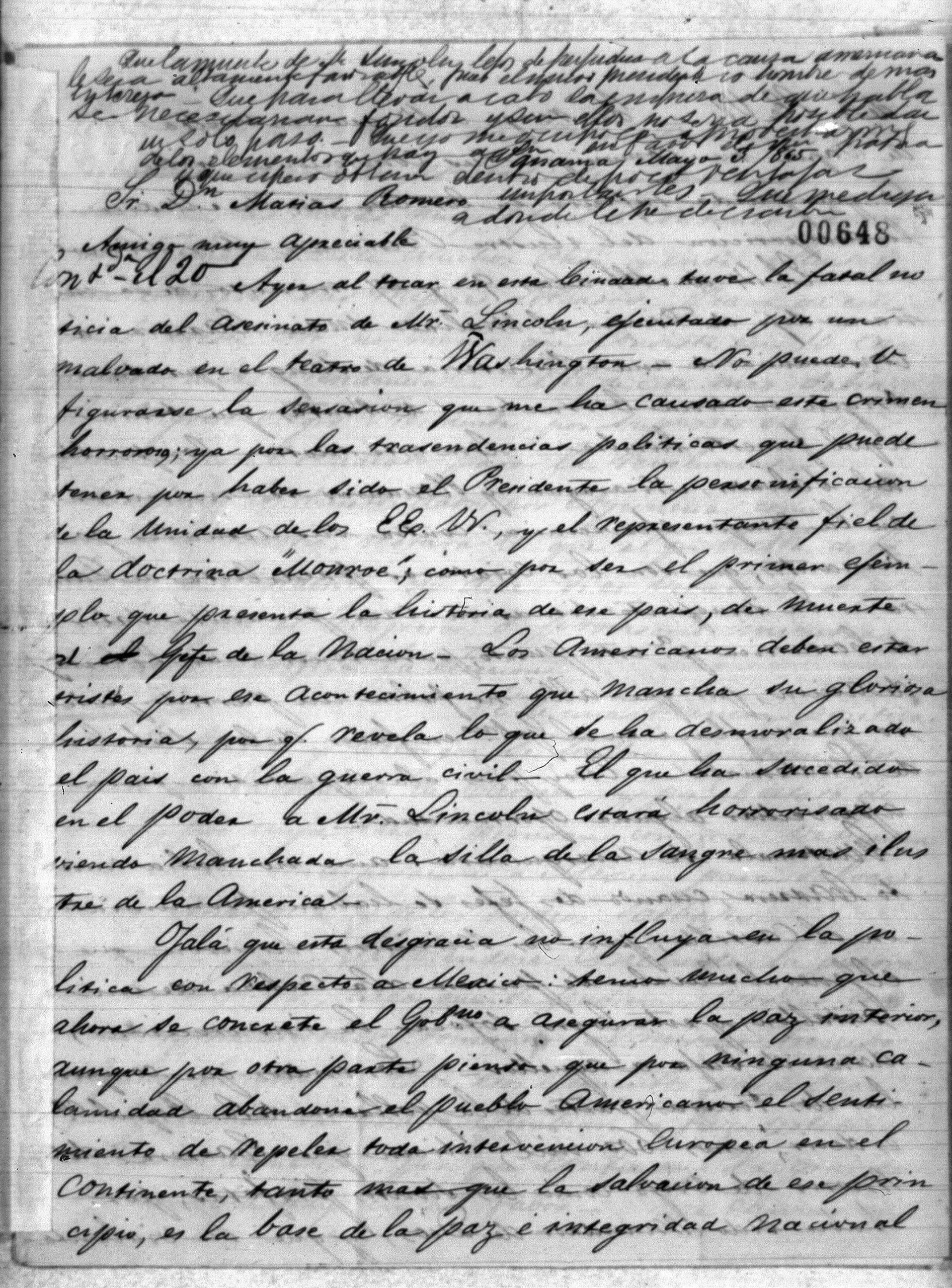
-
Description
Barrios expresses shock at learning of Lincoln’s assassination at the theater. Description of Lincoln as “the personification of US unity and faithful representative of the Monroe Doctrine”. Hope that the assassination won’t influence policy toward Mexico negatively, though it’s likely nothing could lead the Americans to change their stance on European intervention in the hemisphere.
-
Source
Matias Romero: An Inventory of Microfilm of His Papers at the Benson Latin American Collection
-
Rights
This item may be reproduced and used for any purpose, including research, teaching, private study, publication, broadcast or commercial use, with the proper citation and attribution. Citation: Matías Romero: An Inventory of Microfilm of His Papers at the Benson Latin American Collection. LLILAS Benson Latin American Studies and Collections, the University of Texas at Austin.
-
Creator
Barrios, G.
-
Date
May 3, 1865
from May. 8, 1865
Blas Bruznal to Matias Romero
-
Full Title
Letter from Blas Bruznal to Mexican diplomat Matias Romero
-
Description
Bruznal plans to meet with Seward and President Johnson. Speculation as to whether President Johnson understands the global importance of his office.
-
Source
Matias Romero: An Inventory of Microfilm of His Papers at the Benson Latin American Collection.
-
Rights
This item may be reproduced and used for any purpose, including research, teaching, private study, publication, broadcast or commercial use, with the proper citation and attribution. Citation: Matías Romero: An Inventory of Microfilm of His Papers at the Benson Latin American Collection. LLILAS Benson Latin American Studies and Collections, the University of Texas at Austin.
-
Tags
-
Cite this Item
Bruznal, Blas.. "Letter from Blas Bruznal to Mexican diplomat Matias Romero". Remembering Lincoln. Web. Accessed June 25, 2025. https://rememberinglincoln.fords.org/node/484
from May. 8, 1865
Letter from Blas Bruznal to Mexican diplomat Matias Romero
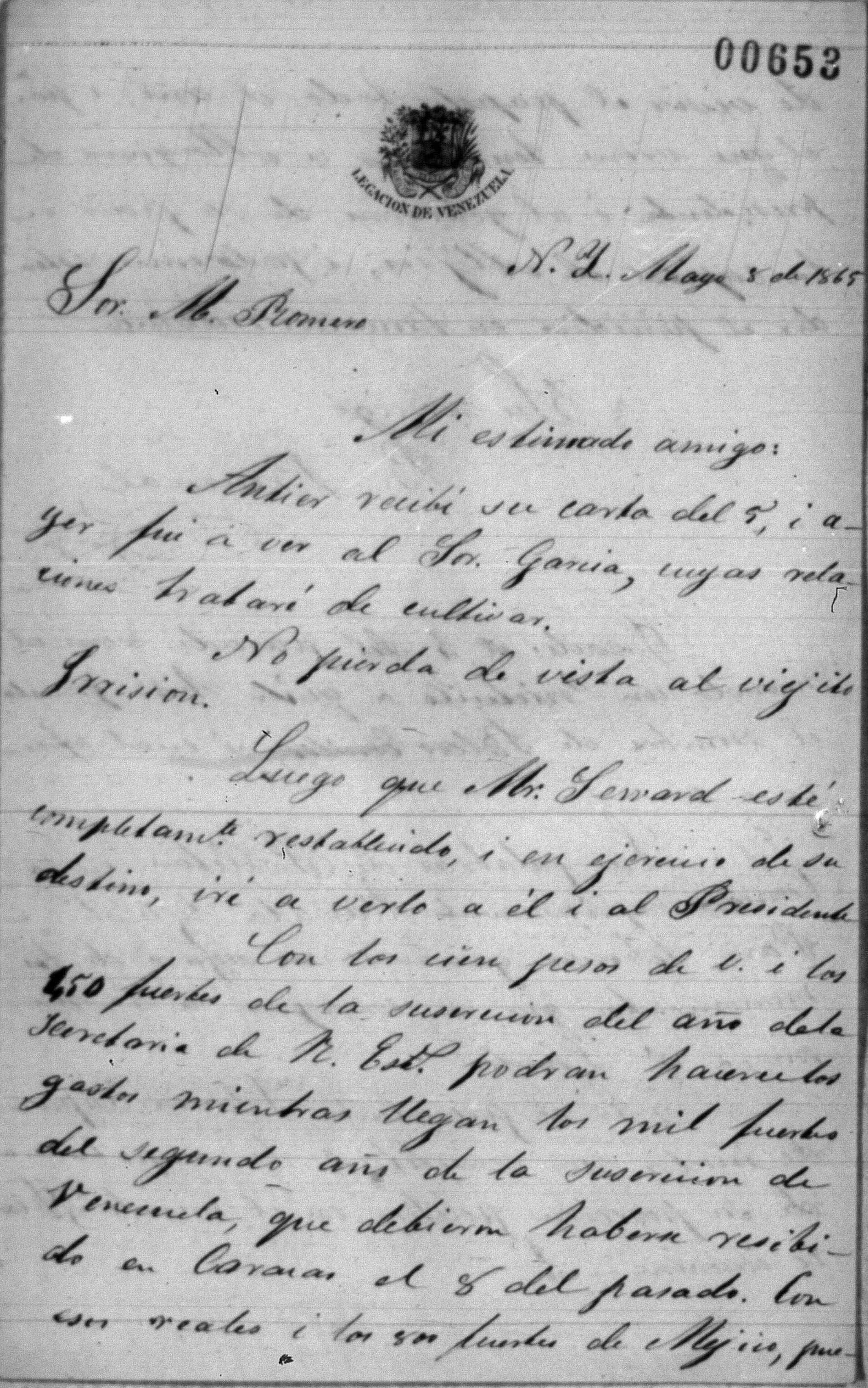
-
Description
Bruznal plans to meet with Seward and President Johnson. Speculation as to whether President Johnson understands the global importance of his office.
-
Source
Matias Romero: An Inventory of Microfilm of His Papers at the Benson Latin American Collection.
-
Rights
This item may be reproduced and used for any purpose, including research, teaching, private study, publication, broadcast or commercial use, with the proper citation and attribution. Citation: Matías Romero: An Inventory of Microfilm of His Papers at the Benson Latin American Collection. LLILAS Benson Latin American Studies and Collections, the University of Texas at Austin.
-
Creator
Bruznal, Blas.
-
Date
May 8, 1865
from Apr. 19, 1865
Felipe Berriozábal to Matias Romero
-
Full Title
Letter to Mexican diplomat Matias Romero from Felipe Berriozábal
-
Description
Reflection on the impact of the assassination, hopes that President Johnson will handle "the matter of Mexico" with less reticence than his predecessor.
-
Source
Matias Romero: An Inventory of Microfilm of His Papers at the Benson Latin American Collection
-
Rights
This item may be reproduced and used for any purpose, including research, teaching, private study, publication, broadcast or commercial use, with the proper citation and attribution. Citation: Matías Romero: An Inventory of Microfilm of His Papers at the Benson Latin American Collection. LLILAS Benson Latin American Studies and Collections, the University of Texas at Austin.
-
Tags
-
Cite this Item
Berriozábal, Felipe.. "Letter to Mexican diplomat Matias Romero from Felipe Berriozábal". Remembering Lincoln. Web. Accessed June 25, 2025. https://rememberinglincoln.fords.org/node/483
from Apr. 19, 1865
Letter to Mexican diplomat Matias Romero from Felipe Berriozábal
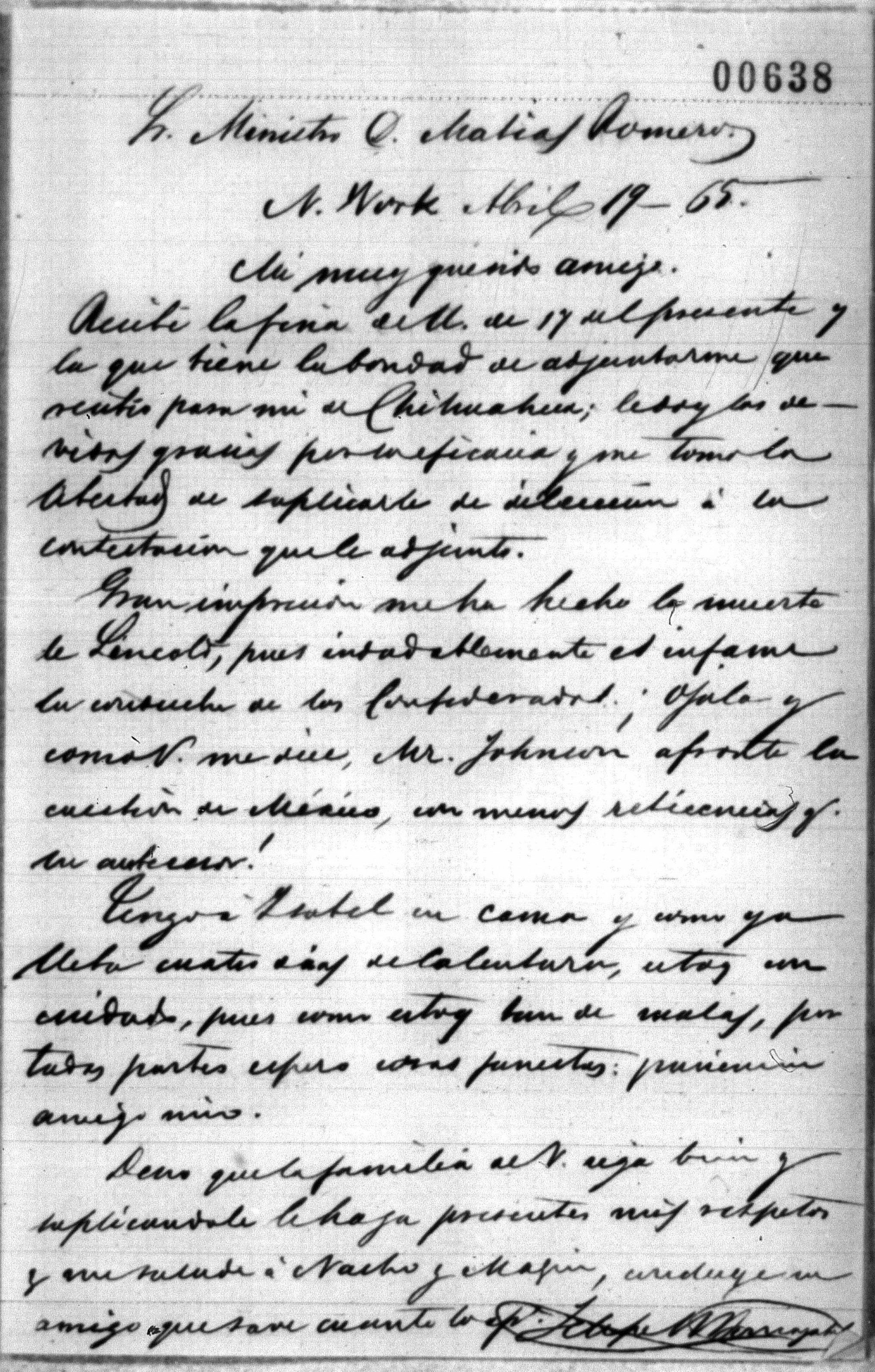
-
Description
Reflection on the impact of the assassination, hopes that President Johnson will handle "the matter of Mexico" with less reticence than his predecessor.
-
Source
Matias Romero: An Inventory of Microfilm of His Papers at the Benson Latin American Collection
-
Rights
This item may be reproduced and used for any purpose, including research, teaching, private study, publication, broadcast or commercial use, with the proper citation and attribution. Citation: Matías Romero: An Inventory of Microfilm of His Papers at the Benson Latin American Collection. LLILAS Benson Latin American Studies and Collections, the University of Texas at Austin.
-
Creator
Berriozábal, Felipe.
-
Date
April 19, 1865
from Apr. 17, 1865
Blas Bruznal to Matias Romero
-
Full Title
Letter to Mexican diplomat Matias Romero from Blas Bruznal
-
Description
Bruznal expresses sympathy upon hearing of the assassination of President Lincoln.
-
Source
Matias Romero: An Inventory of Microfilm of His Papers at the Benson Latin American Collection
-
Rights
This item may be reproduced and used for any purpose, including research, teaching, private study, publication, broadcast or commercial use, with the proper citation and attribution. Citation: Matías Romero: An Inventory of Microfilm of His Papers at the Benson Latin American Collection. LLILAS Benson Latin American Studies and Collections, the University of Texas at Austin.
-
Tags
-
Cite this Item
Bruznal, Blas.. "Letter to Mexican diplomat Matias Romero from Blas Bruznal". Remembering Lincoln. Web. Accessed June 25, 2025. https://rememberinglincoln.fords.org/node/482
from Apr. 17, 1865
Letter to Mexican diplomat Matias Romero from Blas Bruznal
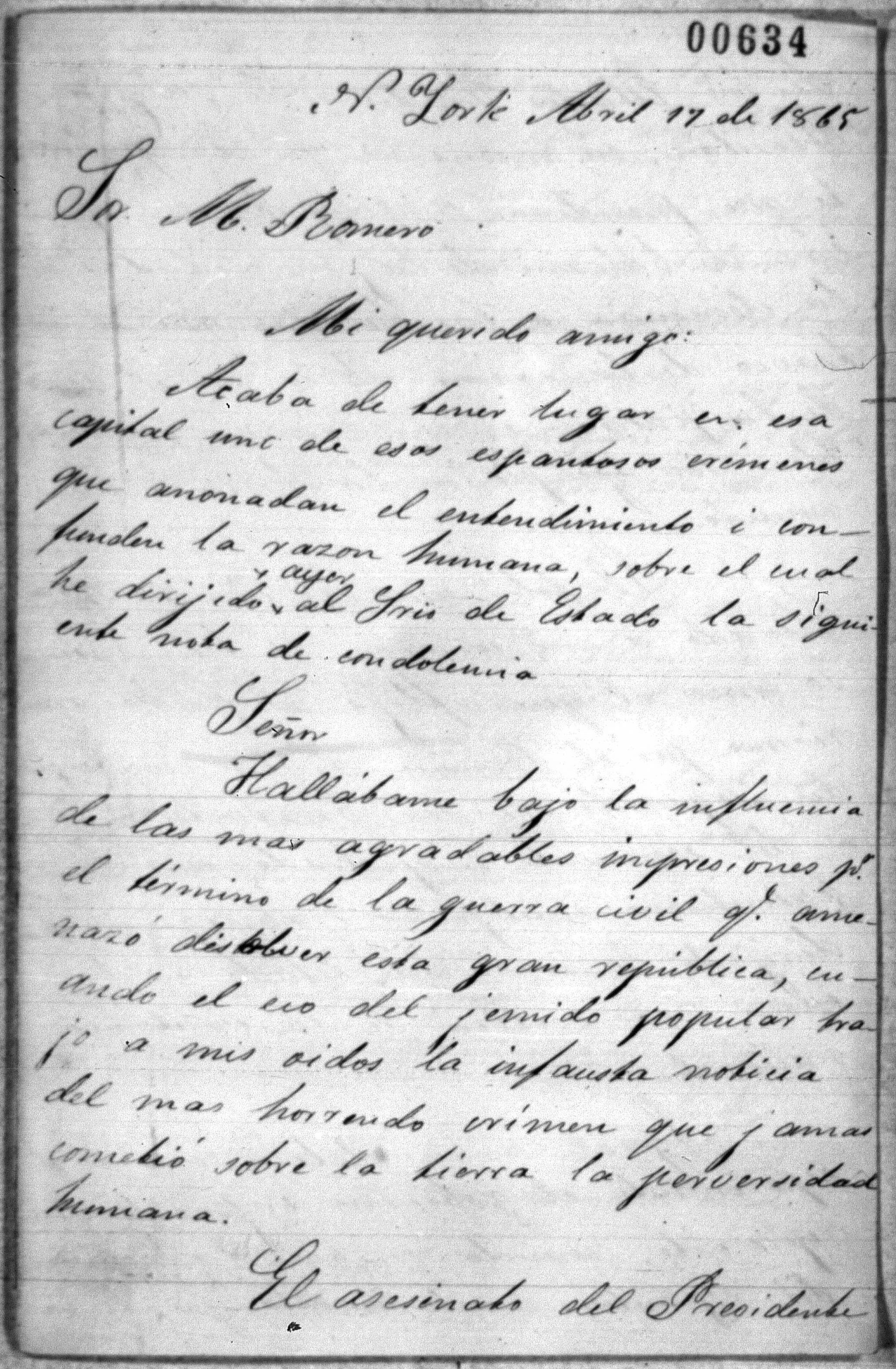
-
Description
Bruznal expresses sympathy upon hearing of the assassination of President Lincoln.
-
Source
Matias Romero: An Inventory of Microfilm of His Papers at the Benson Latin American Collection
-
Rights
This item may be reproduced and used for any purpose, including research, teaching, private study, publication, broadcast or commercial use, with the proper citation and attribution. Citation: Matías Romero: An Inventory of Microfilm of His Papers at the Benson Latin American Collection. LLILAS Benson Latin American Studies and Collections, the University of Texas at Austin.
-
Creator
Bruznal, Blas.
-
Date
April 17, 1865
